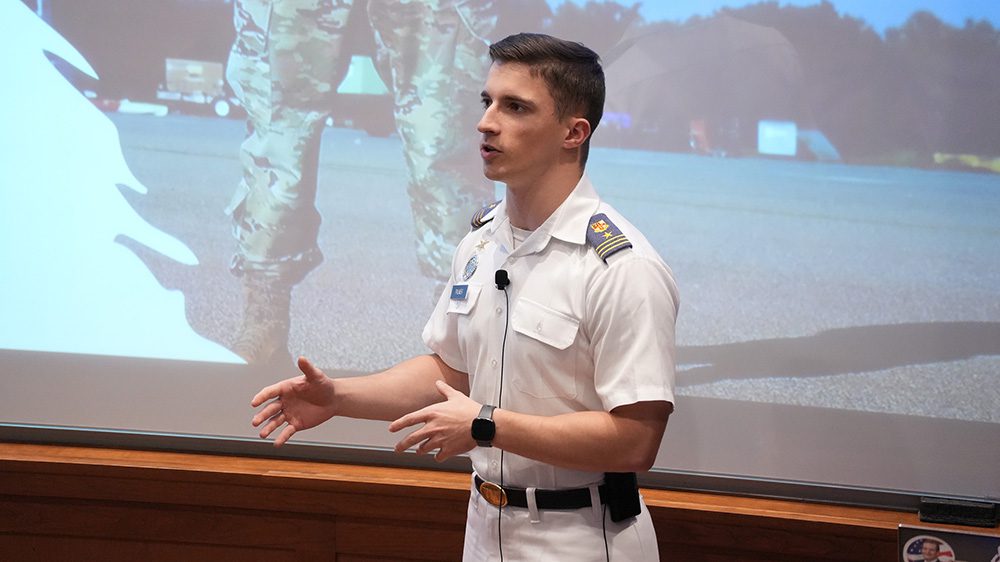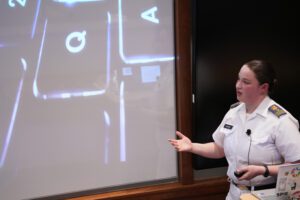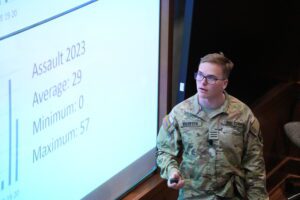Undergraduate Research Symposium 2024

Cadet Dylan Palmer ’24 discusses drones and their capabilities in warfare.—VMI Photo by Kelly Nye.

Cadet Dylan Palmer ’24 discusses drones and their capabilities in warfare.—VMI Photo by Kelly Nye.
Cadets showcased their academic research findings from the Summer Undergraduate Research Institute and individual courses, such as capstone or honors classes, at the annual Undergraduate Research Symposium April 3, 2024. Research projects represented a broad range of fields of study, including presentations on detecting AI-generated writing; crime analysis in Richmond, Virginia; and the ethics of drones in modern warfare.
Abigail Basener ’24, a mathematics major and economics minor from Advance Mills, Virginia, researched “Detecting AI-Generated Writing versus Student Writing.” Her goal was to better understand the computer-generated large language model, a computer program that learns and generates human-like language by finding patterns in the way words string together and guessing the next most likely words to create a model that would predict whether writing was human or generated by LLMs.

Abigail Basener ’24 describes how her model distinguishes between AI and human writing.—VMI Photo by Marianne Hause.
Basener designed her detection model to decide on a set of 21 features and used 2,000 data entries to test her model: 1,000 from human writing and 1,000 from AI. Using her model analysis, Basener was able to meaningfully detect differences between human and AI writing; her model also successfully distinguished human writing from ChatGPT, an LLM.
Col. John David, Ph.D., Department of Applied Mathematics professor, said Basener’s project was “one of the best honors projects I’ve ever seen.”
After graduation, Basener plans to pursue a master’s degree in machine learning—the study of mathematics and computer science in building AI. To learn more about Basener’s project, click here.
Noland Griffith ’24, an economics and business major and applied mathematics minor, researched the data and statistics of crime in neighborhoods with his project, “An Exploratory Analysis of Crime from Randomly Selected Neighborhoods in Richmond, Virginia.”

Noland Griffith ’24 discusses crime data in Richmond, Virginia, during the Undergraduate Research Symposium April 3, 2024.—VMI Photo by Kelly Nye.
For his study, Griffith randomly selected 20 neighborhoods scattered throughout the city of Richmond, chosen from the Richmond Police Department website, which has recorded all criminal reports by date and by street since 2000. Griffith chose to focus his study on the crime of assault in the year 2023.
Griffith looked at nine independent variables in the selected neighborhoods in 2023: Single-family homes, multi-family homes, apartments, businesses, public pools, parks, schools, and churches. He then systematically collected data from the Richmond GeoHub website. One of the most surprising findings in his study was the correlation between higher crime rate and the neighborhoods with churches.
Griffith, who matriculated from Charleston, South Carolina, commissioned into the U.S. Army. To learn more about Griffith’s project, click here.
Dylan Palmer ’24, a computer science major from Mercersburg, Pennsylvania, presented his honors thesis, “Drone Countermeasures, Ethics, and Drones’ Effects on a Modern Battlefield.” According to Palmer’s thesis, the nature of unmanned systems inherently reduces the risk to operators conducting missions during wartime.
Palmer focused primarily on the Russo-Ukrainian War for his research. His research considerations included the types of commercial drones and drone reconnaissance employed by Russia and Ukraine. According to his research, the commercial drones used by both Russia and Ukraine during the conflict have introduced a new way of viewing air littoral, the airspace from the ground up to 500 feet. He also discussed the countermeasures of Counter-Unmanned Aircraft Systems used to detect and/or disable unmanned aircraft such as drones. Palmer then discussed the legal scrutiny other conventional weapons face and said drones should face the same scrutiny, but he concluded that drones ultimately are a necessary feature of war.
Palmer commissioned into the U.S. Army. To learn more about Palmer’s project, click here.
Editor's Note: Story originally published by Virginia Military Institute.